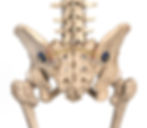
+
+
®
+
+98%
Grade 2 Fusion & Above
1
58%
Higher Resistance to Off-axis Loading
8+
Years of Clinical Use & Success

Traditional Implants Damage Bone During Insertion
Establishing a stable implant-to-bone connection and protecting the bone surrounding the implant is critical. Traditional methods often damage this surrounding bone during surgery, making it weaker and less able to support the implant. This can slow the recovery process, potentially increase complications, and create uneven stress on both the implant and bone over time.
2, 3
Bone Preservation

Legacy Interface
The current standard is a compressive device that damages the bone upon insertion, leading to poor fixation, and a ‘race to healing’ before implant loosening and failure.
-
Crushes & plows during insertion
-
Creates a damaged & unstable interface

UnifiMI Interface
-
Cleanly Prepares & Preserves During Insertion
-
Creates a Stable Mechanically Integrated Interface
Introducing MIS Bone Preservation Technology
UnifiMI MIS Bone Preservation Technology preserves the bone structure, creates a stable foundation and is designed to accelerate the patient’s healing journey.
Mechanical Integration Technology
Unique thread geometry instantly and circumferentially interlocks with bone by entrapping and containing bone between the thread form.
Mechanical Integration creates a structural and functional connection between an implant and bone which transfers and shares loads in a similar manner to biological integration (Osseointegration).
UnifiMI is supported by 10 years of advanced research and development. No other SI Joint System on the market is equipped with advanced UnifiMI technology.


Patented MIS Bone Preservation Interface


PERCUTANEOUS JOINT PREP & DECORTICATION
Decortication has been shown to promote the fusion process by exposing subcortical blood and marrow, encouraging vascularization, osteogenic and inflammatory factors to promote the bone growth necessary to achieve fusion.
4

BIOMECHANICAL PERFORMANCE
Compression, Peak Stripping Torque, & Off-Axis Resistance
Integrity Fasteners with UnifiMI technology exhibited superior biomechanical performance vs. Legacy standard thread designs
20%
58%
89%

Higher peak stripping - allows for more stabilization without losing implant purchase in the bone
Higher resistance to off-axis loading. UnifiMI’s unique interface resists the forces that the body imparts on the implant that can cause loosening or failure much better than other implants
Greater pull-out force than the market leading implant option - leading to stronger stabilization of the joint
51%
More than the maximum compression force generated by leading market implants - this allows the surgeons to compress and stabilize the joint more effectively, which are proven factors in generating fusion

SYSTEM
The Integrity-SI System is clinically proven to reduce post-operative pain, facilitate bony arthrodesis and improve patient outcomes during primary or revision sacroiliac joint fusion procedures.
1, 5
INTEGRITY-SI PATIENT VIDEO
REFERENCES
-
Cross WW 3rd, Tomov MN, Hung MY, Muir JM. Patient-Reported Outcomes and Computed Tomography Review After Minimally Invasive Fusion of the Sacroiliac Joint With Aggressive Joint Decortication and Joint Compression. Orthopedics. 2024 Mar-Apr;47(2):101-107. doi: 10.3928/01477447-20230901-04. Epub 2023 Sep 6. PMID: 37672779.
-
Steiner JA, Ferguson SJ, van Lenthe GH. Screw insertion in trabecular bone causes peri-implant bone damage. Med Eng Phys. 2016 Apr;38(4):417-22. doi: 10.1016/j.medengphy.2016.01.006. Epub 2016 Feb 23. PMID: 26920074.
-
Steiner JA, Christen P, Affentranger R, Ferguson SJ, van Lenthe GH. A novel in silico method to quantify primary stability of screws in trabecular bone. J Orthop Res. 2017 Nov;35(11):2415-2424. doi: 10.1002/jor.23551. Epub 2017 Mar 8. PMID: 28240380.
-
Slappey G, Toribatake Y, Ganey TM, Ogden JA, Hutton WC. Guidelines to decortication in posterolateral spine fusion. J Spinal Disord. 1998 Apr;11(2):102-9. Erratum in: BEQ 1998 Jun;11(3):275. PMID: 9588465.
-
Thompson JC, Marigi E, Cross WW 3rd. Patient-Reported and Radiographic Outcomes After Revision Sacroiliac Joint Fusion. Int J Spine Surg. 2023 Apr;17(2):250-257. doi: 10.14444/8421. Epub 2023 Feb 8. PMID: 36754573; PMCID: PMC10165668
-
Hoel RJ, Ledonio CG, Takahashi T, Polly DW Jr. Sacral bone mineral density (BMD) assessment using opportunistic CT scans. J Orthop Res. 2017 Jan;35(1):160-166. doi: 10.1002/jor.23362. Epub 2016 Aug 26. PMID: 27391403.
-
Sacroiliac Implant Length and Loosening: CT Analysis of Radiographically Loose Components Compared to Controls. Scott Mitchell, MD; Allison Rixey, MD; William Cross, MD. Ortho. Trauma Association Meeting, Oct. 17 – 20, 2018
-
Pace, N. (2018) From Sméagol to Gollum: Mechanical Stress and Bone Remodelling. Open Journal of Orthopedics, 8, 148-167. doi: 10.4236/ojo.2018.84018
-
McAfee PC, Regan JJ, Farey ID, Gurr KR, Warden KE. The biomechanical and histomorphometric properties of anterior lumbar fusions: a canine model. J Spinal Disord. 1988;1(2):101-10. PMID: 2980068.



